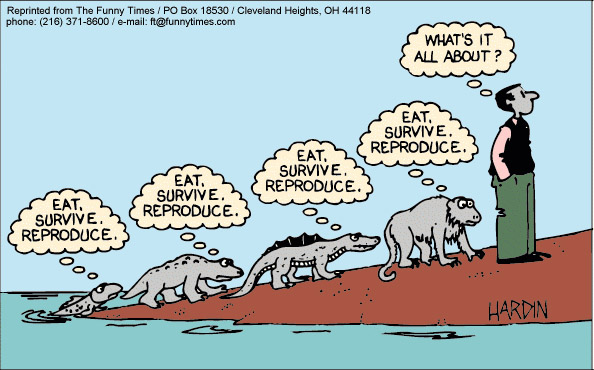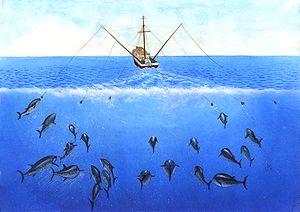Serendip is an independent site partnering with faculty at multiple colleges and universities around the world. Happy exploring!
Week Four (Tues, 2/8): The How and the Why

compliments of cremisi: It's interesting how we have the ability to think of ourselves in the world....Because [our primal] needs are mostly all met, we have the time to sit and observe, to think about the past and future, to ponder the matters at hand, to stew over daily decisions, and to plumb ideas of our existence.
The How and the Why: "every problem in biology, as the evolutionary thinker Ernst Mayr has pointed out, comes in two parts, the how and the why, the proximate explanation and the utimate one" (Natalie Angiers, Woman: An Intimate Geography).
I. but first, some coursekeeping:
for today, we asked you to finish reading
On The Origin of the Species: Chapters IX-XIV (pp. 269-398)
in Thursday's small group sessions,
we'll complete our discussion of that book.
this Friday, Feb. 11: your first 3-4 pp. webpaper is due
Detailed instructions for preparing and posting webpapers are
available on our homepage, along w/ an invitation to "go beyond...."; we're happy to accept/encourage collaborative projects, and those that draw on the resources of the web (active links to your sources; images or soundtracks to make your papers more inviting....).
Next week we shift into the second section of the course:
"Is Evolution a Useful Story Beyond Biology?"
our guide will be the philosopher Daniel Dennett;
for Tuesday, read Part I (pp. 17-145) of his 1995 book,
Darwin's Dangerous Idea: Evolution and the Meanings of Life
N.B.: The Bryn Mawr Bookshop is outsourcing its operation; the new operator, Follett, has some new policies, including returning all spring semester books by February 14. So if you haven't bought Dennett's book, or Power's, or Camus's (and you intend to) you should do that this week.
II. Trolling the forum

First: great VISUAL diversification going on!
we have plants, animals, humans,
the products and traces of humans...
(thanks to ems, Lynn, themword, cremisi....
 |
 |
 |
 |
....Anna, kat, vlopez, tangerines....
 |
 |
 |
 |
 |
 |
 |
 |
...the.believer, Hope, cf88 & poppyflower...)
The forum is also beginning to diversify...
Paul's Group "Faced the Main Fact" that No One Does
the Selecting; Or, It's Randomness All the Way Down
Lynn: we talked about the identity of the selector in "natural selection"... no one actively, knowingly controls the evolution of a species ... the idea of ungoverned change is disquieting enough, but ungoverned, directionless change? ...
elly: I agree that ... we would like to think that there is some greater plan, or order, to things. I sometimes find myself thinking of ... the natural process of death ... as the final "selector."
poppyflower: Between the dissection of Darwin's ideas and terminologies, and the suggestion that the idea of progress is questionable, I feel as if everything I have been brought up with and taught has suddenly been tossed out the window. What was once concrete and unquestionable ... now seems as if it is not necessarily the truth....The entire concept is to me, a bit unsettling and eye opening. ...I feel a bit like the people who lived during Darwin's time did, when everything they ever new about evolution was completely changed.
KT: despite our CHOSEN intentions, things could happen one way just as easily as another. Initially, I found that idea extremely disconcerting, I want to believe that I can plan and that the choices I make in life will lead me to a certain place. I want to believe that I will not be diverted by the random interactions with others who were additionally influenced by people, conditions, circumstances etc… The good thing, however, is that it makes me thankful for the benefits of how connected we are. We have the ability to affect each other in positive ways, which helps to shape the forces that will influence us all. Take that, Randomness! ;-)
hope: Who is it that said we are all just stardust? I like that. To think that all of these thoughts and feelings I have that seem so important to me are just chemicals moving around in my head. Chemicals my DNA told my body to make, DNA that is just an accumulation of millions of years of accidents. I like to try to imagine the story from the beginning. I find the randomness beautiful. A long time ago nothing exploded into something. Some stars formed, cooked up the elements, exploded. Earth and the sun were born. Life emerged, evolved. And now here I am. Stardust, with feelings.
Anne's Group Thought about the Difference between
Foundational and Emergent Stories, and
Foundational and Emergent Ways of Reading
(i.e.: not just different types of stories,
but different ways of handling them...)
ems8140: I think that it is important to view the world in a non-foundational way, in order to allow for time, change, complexity and movement forward.
ashley: Being asked whether two (or more) very distinct theories on how life came to be can simultaneously exist side by side ... reminds me of code-switching, in which a person who is knowledgeable of various languages can easily go from speaking/writing one language to another....Having these two mindsets intact is in a way being bilingual.
vlopez: we are all incredibly different individuals with different cultures, life experiences, and hopes. Therefore, every one of these stories ... could be either foundational or not foundational - it all depends on the reader. There will never be one story that is foundational to all. ...It is nearly impossible ...to have only one overarching theory or story that agrees with everyone's ideals, cultures, experiences, etc.
alexandrakg: So, in class last Thursday we were discussing two different ways of looking at the progression (or I guess lack there of) of life, foundational and non-foundational, non-narrative and narrative, and came to the conclusion that many of us have a hybridized idea of the world based on both sides. I still can't quite wrap my head around that.
AnnaP: I was combining a narrative with a non-narrative sense of the world.... I felt comfortable with the idea of a narrative religion, of a god or force that watched over and listened to people’s prayers/stories and decided whether or not to incorporate them into the narration of life. Perhaps this would fall under the highly ambiguous category of “semi-narrative” , in that it accounts for change but still has certain static, hierarchical elements.
katlittrell: most of us seem to exist in some sort of hybrid belief state between foundational and narrative stories .... for some aspects of my life I believe in something similar to Fate .... For the other parts of my life, I am perfectly happy to admit that coincidence and chance rules me .... thinking of this dual belief in Fate and coincidence ... in terms of a blending of foundational and non-foundational thoughts seems understandable and comfortable to me
tangerines: the divide between foundational and non-foundational stories we talked about seems to be yet another binary that doesn't serve a purpose .... we all believe in something .... One can only claim that an event or action was “God's will” if one ... has the whole script .... our ignorance of the underlying patterns ... causes us to believe that everything is merely chance ... our ignorance of the existing plan will very likely cause us to misinterpret the events we experience .... the stories themselves are not as important as the ways in which the stories are interpreted.
So, Paul: a few more interpretations, please?


